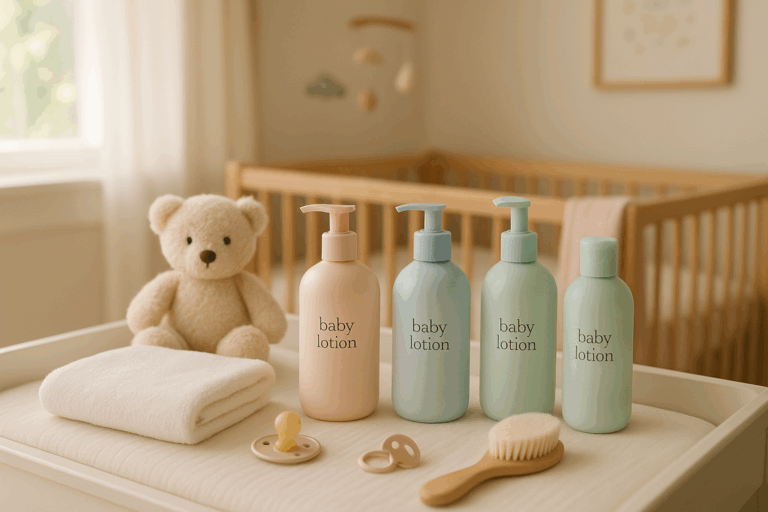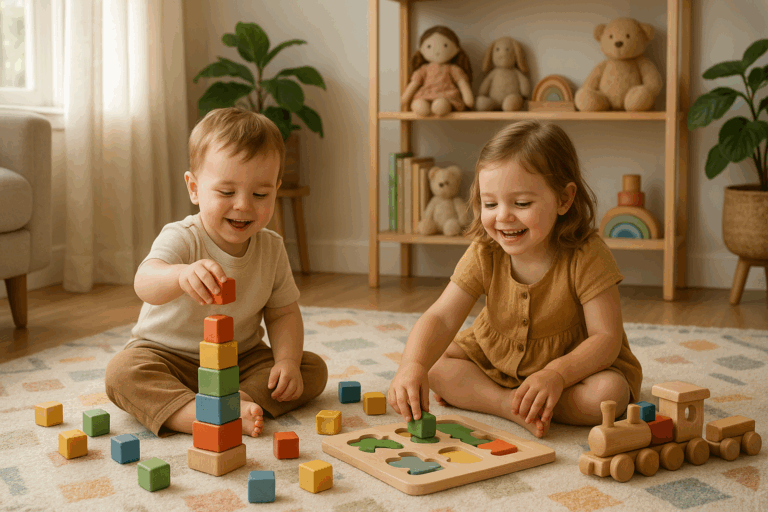👶✨ Equally pure should be the clothes that wrap their delicate skin, protecting it while allowing it to breathe. Organic baby clothes serve this purpose with an added advantage – they also contribute to preserving the environment. 🌿
The question that may hover in your mind is, ‘What are organic baby clothes, and why are they important?’ If you find yourself pondering on this, you’re not alone. It’s a discussion gaining traction among conscious parents aiming to provide their little ones with the best. In this comprehensive guide, we delve into the world of organic baby clothes, discovering its benefits for your child’s comfort and health.
While the conventional baby clothes we see in stores may be cute and trendy, they often carry invisible threats. Synthetic fabrics, harsh dyes, and harmful chemicals used in the manufacturing processes can lead to skin irritation, allergies, and more severe health issues in babies. 🏭💀 Organic baby clothes come as a beacon of hope in such a scenario. They are free from harmful chemicals, kinder to your baby’s skin, and ethically produced.
From understanding the journey of organic cotton from the field to your baby’s wardrobe, to the substantial benefits it offers, we will explore each aspect in detail. Get ready to embark on this insightful journey and make informed decisions for your baby’s wellbeing. 👍📚
The Journey of Organic Cotton 🌱👕
Organic cotton, the primary material used for organic baby clothes, is grown using methods and materials that have a low impact on the environment. It involves practices that maintain soil fertility, promote biological diversity, and avoid the use of synthetic pesticides and fertilizers. This journey from field to fabric ensures that the clothes your baby wears are free from harmful residues.
Why Choose Organic Baby Clothes? 💡
The choice of organic baby clothes brings along a myriad of benefits. Your little one’s skin is sensitive and highly permeable. Traditional baby clothes, laden with toxins, can lead to skin irritations, rashes, and allergies. On the other hand, organic baby clothes are free from these harmful elements, reducing the risk of skin conditions and promoting healthier skin.
Conscious Choice for a Better Future 🌍👶
Besides the health benefits for your baby, choosing organic baby clothes is a conscious choice towards a better future. Organic farming practices contribute to reducing water pollution, improving soil quality, and promoting biodiversity. By opting for organic baby clothes, you’re playing a significant role in reducing the environmental footprint of the textile industry.
So, as we dive deeper into the details, prepare yourself for a paradigm shift. The benefits of organic baby clothes are manifold, impacting not just your baby’s comfort and health but also contributing towards a sustainable future. Join us as we explore this further, understanding each facet of this conscious choice for your little one’s wellbeing. After all, when it comes to your baby, every decision matters, and choosing organic baby clothes could be a step in the right direction. 🌈👣
Discovering Organic Baby Clothes: A Deep Dive into the Trend
Every parent wants the best for their child, which includes the comfort and health that come from the clothes they wear. This quest for the optimal wellbeing of a child has led to the rise of organic baby clothes. But what exactly does “organic” mean when it comes to baby clothes, and what are its benefits? Let’s uncover the facts.
Organic baby clothes are made from materials grown and produced without the use of synthetic fertilizers, pesticides, or other chemicals. The fabrics used for these clothes include organic cotton, hemp, bamboo, and wool. These materials are more sustainable, safer, and softer than conventional fabrics, making them the ideal choice for your little one’s delicate skin.
The benefits of organic baby clothes range from protecting your child’s skin from irritants and allergens, supporting sustainable farming practices, to contributing to a lower ecological footprint. To delve deeper into these advantages, let’s go step by step, understanding the benefits of each organic material and its impact on your child’s comfort and health.
The Majesty of Organic Materials: Cotton, Hemp, Bamboo, and Wool
Organic Cotton
Organic cotton is grown without harmful chemicals, making it softer, more durable, and hypoallergenic. These qualities make it perfect for your baby’s sensitive skin, reducing the chances of skin irritation and allergies. The “Cotton vs. Organic Cotton: A Comparison” video by Sustainable Jungle (YouTube) illustrates these benefits in detail.
Hemp
Hemp is another organic material that is gaining popularity for baby clothes. It’s incredibly durable, breathable, and UV-resistant. The absence of chemicals during cultivation and production also reduces the risk of skin irritation. Moreover, hemp is a highly sustainable crop requiring minimal water and no pesticides to grow.
Bamboo
Bamboo fabric is a revelation in the world of organic baby clothes. It’s incredibly soft, hypoallergenic, and has excellent thermal regulating properties. This means it can keep your baby cooler in hot weather and warmer in cold conditions. Plus, bamboo is a fast-growing plant that requires no pesticides or fertilizers, making it an eco-friendly option.
Organic Wool
Organic wool is free from synthetic treatments, making it safe for your baby’s skin. It’s also breathable, moisture-wicking, and flame-resistant. The warmth and comfort it provides make it ideal for baby blankets and winter clothes.
Benefits of Organic Baby Clothes: From Skin Comfort to Sustainability
The benefits of organic baby clothes go beyond just comfort and health. They extend to environmental sustainability and support for ethical farming practices. Let’s explore these benefits in more depth.
Benefits
Description
Skin-Friendly
Organic materials are softer, hypoallergenic, and free from harmful chemicals, reducing the risk of skin irritation and allergies.
Eco-friendly
Organic farming practices are sustainable and result in lower pollution and energy consumption. Plus, organic clothes are often biodegradable.
Supports Ethical Practices
Organic farming promotes fair trade, ensures good working conditions for farmers, and supports local communities.
Consider the video “Why Choose Organic Baby Clothes?” by Finn + Emma on YouTube for a comprehensive understanding of these benefits.
The Impact of Your Choice: Your Baby’s Health and Our Planet
Choosing organic baby clothes is a significant step towards ensuring the comfort and health of your baby and contributing to a more sustainable and equitable world. As a consumer, your choices matter. When you opt for organic baby clothes, you not only choose the best for your child but also make a statement about the kind of world you want to leave behind for them.
Now that you are informed about the benefits of organic baby clothes, it’s time to make the switch. Consider buying from brands that are transparent about their supply chain and are certified organic. Remember, every little step counts when it comes to your child’s health and our planet’s future.
ConclusionIn conclusion, we have thoroughly discussed the criticality of innovative digital technologies in the field of Information Technology and Engineering. We’ve delved into the depth of AI technology, Cloud Computing, IoT, Blockchain technology, among others, and explored how they have revolutionized various sectors in today’s digital age. It is evident that understanding these technologies is not just beneficial but is a necessity for everyone in these sectors.
The role of AI in transforming business operations can’t be overstated. Whether it’s automating tasks, providing valuable insights, or enhancing customer experience, the potential applications of AI are virtually endless. As we previously discussed, AI is no longer a far-fetched concept but an integral part of our daily lives. 🤖
Next, we’ve talked about Cloud Computing, a technology that has changed the way data is stored and accessed. We’ve seen how businesses can save on costs, improve efficiency, and enhance their scalability with Cloud Computing. ☁️
Furthermore, we’ve examined the influence of IoT in creating a highly interconnected digital ecosystem. IoT devices not only make our lives easier but also open up new avenues for businesses, providing real-time data and insights. 💡
We’ve also discussed the transformative power of Blockchain technology, which is redefining trust and security in digital transactions. Blockchain holds the potential to disrupt various sectors, from finance to supply chain, and even healthcare. 🔗
In summary, it’s safe to say that these technologies are not just shaping our present but will also dictate our future. They’re changing the way we live, work, and interact with the world around us. Hence, understanding them becomes crucial for anyone who wants to stay ahead in this digital age.
I encourage you to delve deeper into these topics, to explore and learn more. After all, continuous learning is the key to success in this ever-evolving digital landscape. I also urge you to apply what you’ve learned in your respective fields, be it improving your business operations, enhancing customer experience, or even starting a new venture.
I would love to hear your thoughts on these topics. Feel free to share your experiences, insights, or questions in the comments below. 🙋♂️
If you found this article helpful, don’t forget to share it with your colleagues and friends. Also, do subscribe for more such informative content. 📩
For further reading, you can refer to the following links:
– IBM: What is AI?
– Amazon: What is Cloud Computing?
– Cisco: What is IoT?
– IBM: What is Blockchain?
Let’s continue to learn, explore, and create a better future with these technologies. After all, the future is digital. Let’s embrace it! 🚀
References:
– IBM
– Amazon
– Cisco
– IBM



